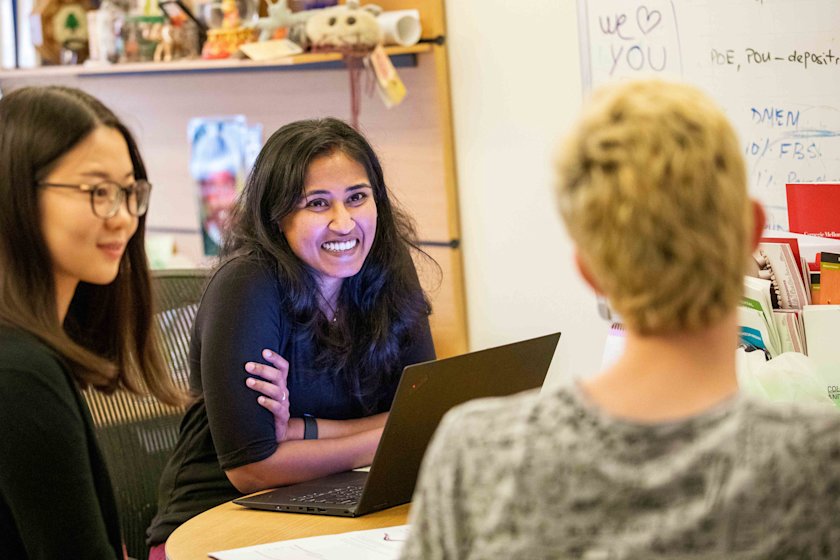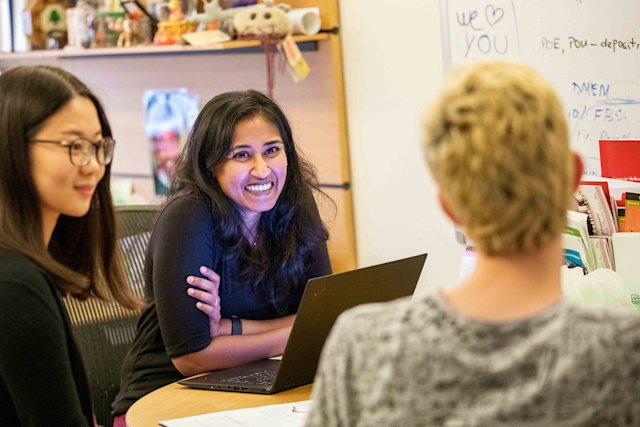At The Front Of The Mind
While protecting people from the physical ravages of COVID-19 was the world’s top priority in 2020, the pandemic also placed mental health in the global spotlight, as people everywhere were forced to cope with uncertainty, isolation, apprehension, and a new way of living born of necessity rather than choice.
Throughout the year, Qatar Foundation (QF) sought to highlight the importance of nations, organizations, and individuals focusing on mental wellbeing as well as their physical health, with its global healthcare initiative the World Innovation Summit for Health (WISH) playing a leading role in transmitting the message that, for those who are struggling, speaking out and seeking help is a sign of strength, not weakness.
And in August, WISH brought together sporting stars who performed and succeeded at the highest level of football, cricket, and athletics to speak about the mental toll that elite-level sport brings – driving home the fact that, regardless of fame or status, psychological illness does not discriminate.
While protecting people from the physical ravages of COVID-19 was the world’s top priority in 2020, the pandemic also placed mental health in the global spotlight, as people everywhere were forced to cope with uncertainty, isolation, apprehension, and a new way of living born of necessity rather than choice.
Throughout the year, Qatar Foundation (QF) sought to highlight the importance of nations, organizations, and individuals focusing on mental wellbeing as well as their physical health, with its global healthcare initiative the World Innovation Summit for Health (WISH) playing a leading role in transmitting the message that, for those who are struggling, speaking out and seeking help is a sign of strength, not weakness.
And in August, WISH brought together sporting stars who performed and succeeded at the highest level of football, cricket, and athletics to speak about the mental toll that elite-level sport brings – driving home the fact that, regardless of fame or status, psychological illness does not discriminate.
The need to nurture mental wellbeing as well as physical health was highlighted by QF in a month that illustrated the organization’s dedication to supporting innovation and entrepreneurship – and saw the arrival of new ideas and perspectives within its higher education ecosystem.
Did you know that more than 35% of athletes suffer with mental health issues? Join me tomorrow with @WISHQatar to be part of the discussionhttps://t.co/UazBFjWCXN
— Kelly Holmes (@damekellyholmes) August 25, 2020
Acclaim and anguish
The online event, Mental Health & Sport: The Challenging of Balancing Risk With Reward, saw Olympic gold medal-winning athlete Dame Kelly Holmes, former Liverpool and England footballer Robbie Fowler, and Wasim Akram, the ex-captain of the Pakistan cricket team, reveal the personal turmoil they suffered despite the glory and adulation they enjoyed during their careers.
More than 10,000 people from 62 countries saw Dame Kelly, whose injuries led to her self-harming, say: “As a sportsperson, you are not superhuman, and when you are struggling, ask for someone’s help. Opening up to people has helped me deal with my life and realize that none of us can be anything more than we are.
“Having the mental issues I have had, and learning to deal with them and talk about them, is perhaps one of the greatest successes I have had.”
The online event, Mental Health & Sport: The Challenging of Balancing Risk With Reward, saw Olympic gold medal-winning athlete Dame Kelly Holmes, former Liverpool and England footballer Robbie Fowler, and Wasim Akram, the ex-captain of the Pakistan cricket team, reveal the personal turmoil they suffered despite the glory and adulation they enjoyed during their careers.
More than 10,000 people from 62 countries saw Dame Kelly, whose injuries led to her self-harming, say: “As a sportsperson, you are not superhuman, and when you are struggling, ask for someone’s help. Opening up to people has helped me deal with my life and realize that none of us can be anything more than we are.
“Having the mental issues I have had, and learning to deal with them and talk about them, is perhaps one of the greatest successes I have had.”
Opening up to people has helped me deal with my life and realize that none of us can be anything
10,000+ people from 62 countries watched the WISH webinar on mental health and sport
- I’m very happy to be part of the @WISHQatar discussion on #MentalHealth and sport this Wednesday, 26 August 2020. An important topic that deserves our attention. #MentalHealthAndSport pic.twitter.com/M79me1ZzRm
— Wasim Akram (@wasimakramlive) August 24, 2020
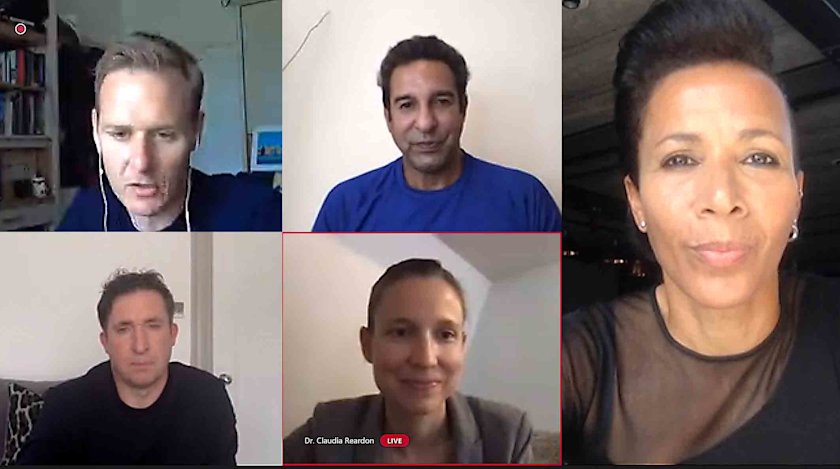
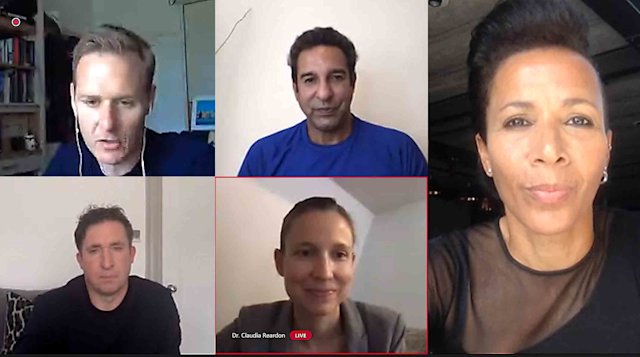
Bolstering the frontline
Among those under the greatest strain in 2020 were frontline health workers, who found themselves in the eye of the COVID-19 storm, and Qatar Biomedical Research Institute (QBRI) played its part in supporting them through a program that provided high-caliber volunteers to Hamad Medical Corporation (HMC) over the summer months.
The institute – part of QF’s Hamad Bin Khalifa University (HBKU) – also placed its research staff at HMC’s disposal to be ready to give assistance wherever required within its laboratories. As Dr. Afif Ben Mahmoud, Senior Research Associate at QBRI, explained: “I volunteered because I have always felt that assisting others is what makes us human – it was fulfilling to extend a helping hand to others and contribute through knowledge-sharing.”
The program was just the latest element of QBRI’s efforts to support Qatar’s healthcare sector amid the pandemic, with the institute having helped to ensure the availability of the reagents that are vital for COVID-19 testing, and provided testing equipment and expertise from its laboratories to HMC.
Among those under the greatest strain in 2020 were frontline health workers, who found themselves in the eye of the COVID-19 storm, and Qatar Biomedical Research Institute (QBRI) played its part in supporting them through a program that provided high-caliber volunteers to Hamad Medical Corporation (HMC) over the summer months.
The institute – part of QF’s Hamad Bin Khalifa University (HBKU) – also placed its research staff at HMC’s disposal to be ready to give assistance wherever required within its laboratories. As Dr. Afif Ben Mahmoud, Senior Research Associate at QBRI, explained: “I volunteered because I have always felt that assisting others is what makes us human – it was fulfilling to extend a helping hand to others and contribute through knowledge-sharing.”
The program was just the latest element of QBRI’s efforts to support Qatar’s healthcare sector amid the pandemic, with the institute having helped to ensure the availability of the reagents that are vital for COVID-19 testing, and provided testing equipment and expertise from its laboratories to HMC.
I volunteered because I have always felt that assisting others is what makes us human
Opportunity through teamwork
Meanwhile, a research collaboration between QBRI, Qatar Environment and Energy Research Institute (QEERI) – also part of HBKU – the Public Works Authority (Ashghal), QF partner university Weill Cornell Medicine-Qatar (WCM-Q), and HMC led to municipal wastewater in Qatar being monitored for COVID-19, a process that can give a good indication of the virus’ prevalence among the population.
And WCM-Q and the National Museum of Qatar teamed up to give high school students across Qatar the opportunity to learn about the biology and spread of coronavirus through the All About Science: The Biology of Pandemics program.
Using mathematical tools, students explored how scientists study the virus, and how measures such as social distancing, vaccinations, and travel restrictions affect its chances of spreading.
Meanwhile, a research collaboration between QBRI, Qatar Environment and Energy Research Institute (QEERI) – also part of HBKU – the Public Works Authority (Ashghal), QF partner university Weill Cornell Medicine-Qatar (WCM-Q), and HMC led to municipal wastewater in Qatar being monitored for COVID-19, a process that can give a good indication of the virus’ prevalence among the population.
And WCM-Q and the National Museum of Qatar teamed up to give high school students across Qatar the opportunity to learn about the biology and spread of coronavirus through the All About Science: The Biology of Pandemics program.
Using mathematical tools, students explored how scientists study the virus, and how measures such as social distancing, vaccinations, and travel restrictions affect its chances of spreading.
31 High school students participated in the All About Science: The Biology of Pandemics Program
Qatar’s water was monitored for COVID-19 for 8 weeks
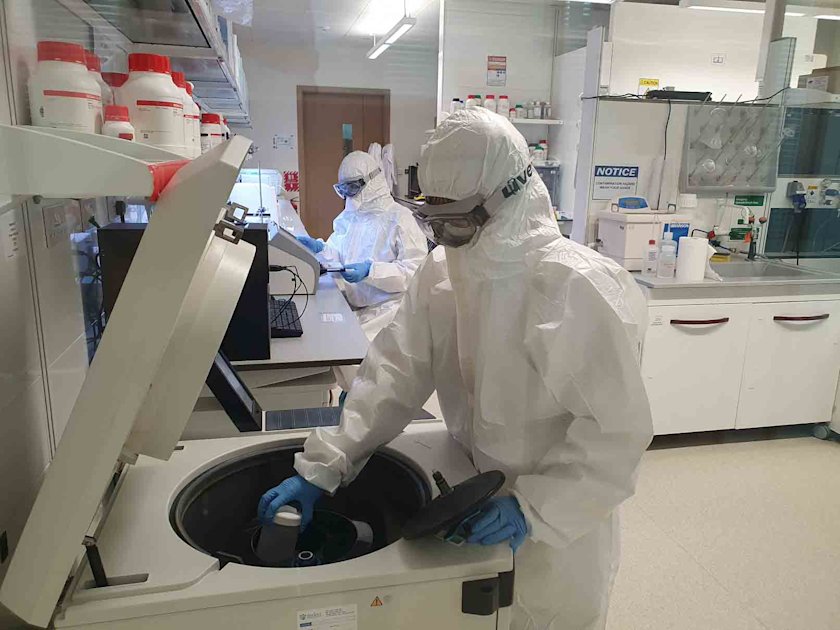
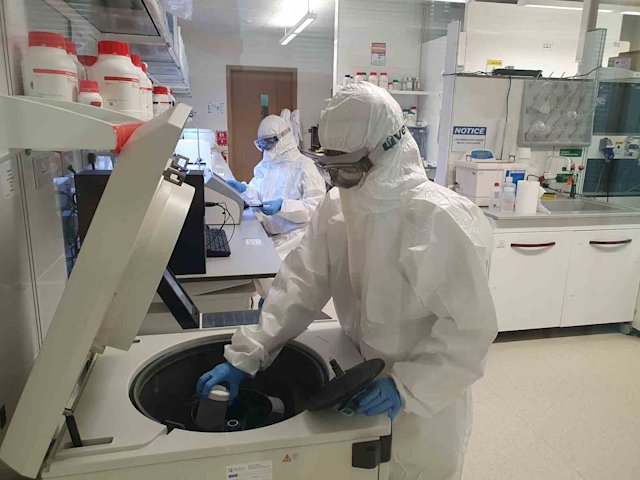
Helping the healing process
Breakthroughs, innovations, and entrepreneurship were in plentiful supply at QF during August. A research group at Texas A&M University at Qatar (TAMUQ), one of the organization’s partner universities, made strides toward developing next-generation orthopedic implants. As well as being extremely strong, they are also biodegradable – potentially removing the need for implant removal surgeries, and lessening a patient’s stress and recovery time.
“Biodegradable implants support a broken bone as it heals, degrade in a timely manner, and ‘disappear’ completely once the healing is complete,” said Dr. Bilal Mansoor, Associate Professor of Mechanical Engineering at TAMUQ.
“For healthcare providers, it will mean more prudent use of a surgeon’s time as well as healthcare resources – a win-win situation for everyone involved.”
Breakthroughs, innovations, and entrepreneurship were in plentiful supply at QF during August. A research group at Texas A&M University at Qatar (TAMUQ), one of the organization’s partner universities, made strides toward developing next-generation orthopedic implants. As well as being extremely strong, they are also biodegradable – potentially removing the need for implant removal surgeries, and lessening a patient’s stress and recovery time.
“Biodegradable implants support a broken bone as it heals, degrade in a timely manner, and ‘disappear’ completely once the healing is complete,” said Dr. Bilal Mansoor, Associate Professor of Mechanical Engineering at TAMUQ.
“For healthcare providers, it will mean more prudent use of a surgeon’s time as well as healthcare resources – a win-win situation for everyone involved.”
It will mean more prudent use of a surgeon’s time as well as healthcare resources – a win-win situation for everyone involved
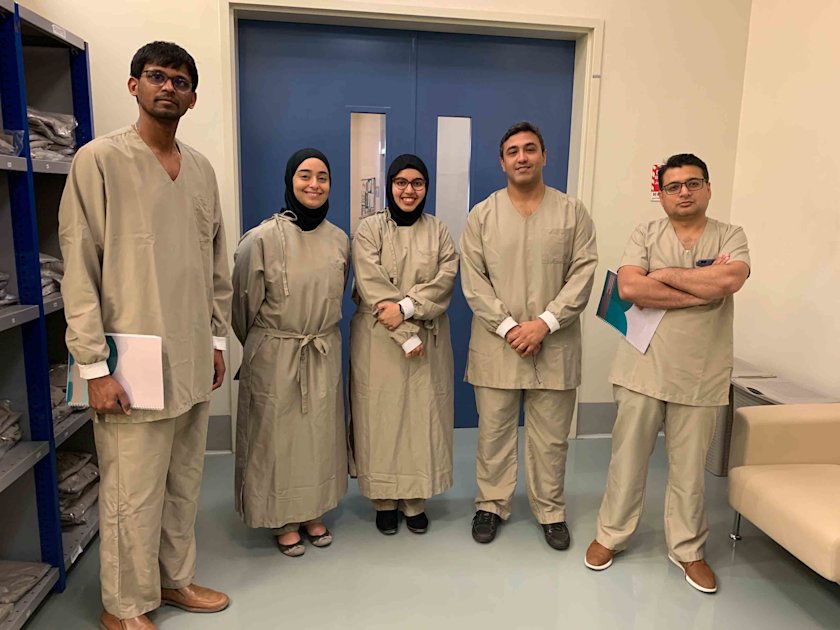
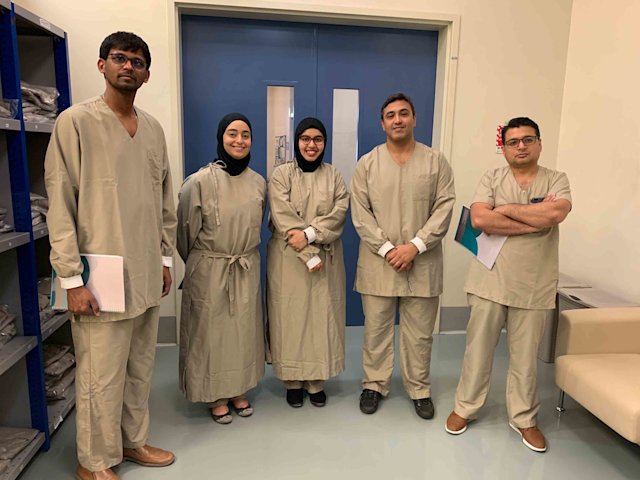
Inclusive innovation
Researchers at WCM-Q devised a new way of testing cancer treatments to reveal how some tumors can resist chemotherapy drugs and continue to spread, while QEERI scientists developed a new, more efficient type of filtration technology that can remove small oil droplets from seawater – a crucial area for Qatar, which largely relies on desalination for clean drinking water.
And a group of seven alumni of QF partner university HEC Paris at Qatar revealed the goals for their new digital startup cWallet, designed to make digital financial transactions possible for millions of low-income workers around the world who do not or cannot have bank accounts.
Already in use in Qatar, the team aim to expand cWallet to other countries, with its CEO and founder Michael Javier saying: “A cashless society is the future, but if you’re promoting a cashless future, you need to promote financial inclusion and financial literacy too.”
Researchers at WCM-Q devised a new way of testing cancer treatments to reveal how some tumors can resist chemotherapy drugs and continue to spread, while QEERI scientists developed a new, more efficient type of filtration technology that can remove small oil droplets from seawater – a crucial area for Qatar, which largely relies on desalination for clean drinking water.
And a group of seven alumni of QF partner university HEC Paris at Qatar revealed the goals for their new digital startup cWallet, designed to make digital financial transactions possible for millions of low-income workers around the world who do not or cannot have bank accounts.
Already in use in Qatar, the team aim to expand cWallet to other countries, with its CEO and founder Michael Javier saying: “A cashless society is the future, but if you’re promoting a cashless future, you need to promote financial inclusion and financial literacy too.”
7 QF alumni developed the cWallet digital startup
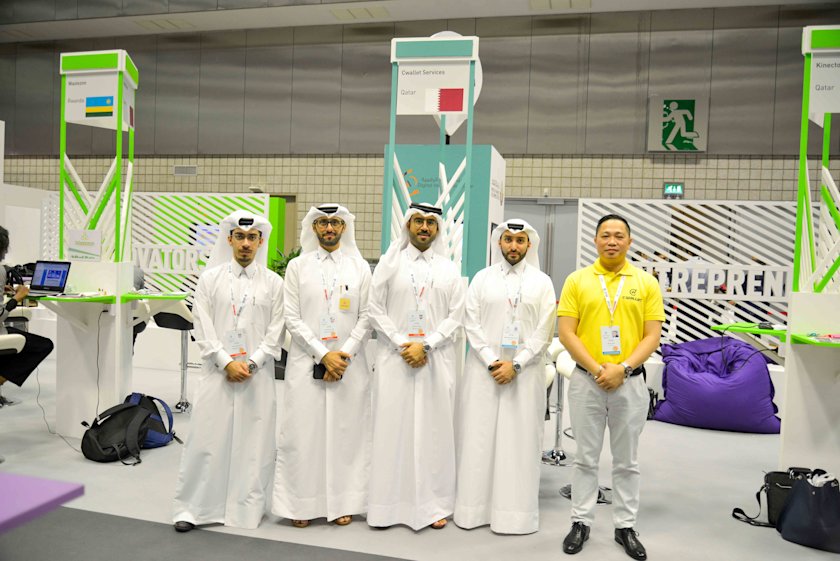
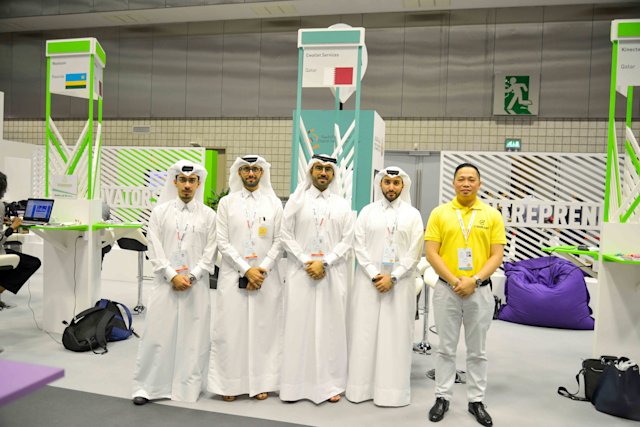
Entrepreneurial vision
Elsewhere, Ali Al-Rashid, a PhD candidate at HBKU, unveiled his QF-funded robot on wheels that acts as a security guard by day - verifying the Ehteraz app status of people entering a building – and a cleaner at night, as it uses liquid disinfectant and UV light to sanitize spaces; while a platform inspired by QF that connects innovators around the world with the aim of creating solutions to humanity’s greater problems began working on a device that could lead to quicker detection of COVID-19-induced pneumonia.
SynSapien is an Artificial Intelligence-driven web application that enables innovators from different countries to collaborate in creating new technologies that break down complex challenges. Its team is now working with researchers from 14 countries to develop an early detection system for vulnerable people to raise the alarm if it warns them they may be at risk of pneumonia.
Co-founder Basil Mahfouz, an alumni of QF partner university Georgetown University in Qatar, said: “I spent four years in the culture of QF, and it showed me the value of connecting with people from different disciplines and what it can lead to – the interdisciplinary nature of QF is reflected in what SynSapien enables people to do.”
Elsewhere, Ali Al-Rashid, a PhD candidate at HBKU, unveiled his QF-funded robot on wheels that acts as a security guard by day - verifying the Ehteraz app status of people entering a building – and a cleaner at night, as it uses liquid disinfectant and UV light to sanitize spaces; while a platform inspired by QF that connects innovators around the world with the aim of creating solutions to humanity’s greater problems began working on a device that could lead to quicker detection of COVID-19-induced pneumonia.
SynSapien is an Artificial Intelligence-driven web application that enables innovators from different countries to collaborate in creating new technologies that break down complex challenges. Its team is now working with researchers from 14 countries to develop an early detection system for vulnerable people to raise the alarm if it warns them they may be at risk of pneumonia.
Co-founder Basil Mahfouz, an alumni of QF partner university Georgetown University in Qatar, said: “I spent four years in the culture of QF, and it showed me the value of connecting with people from different disciplines and what it can lead to – the interdisciplinary nature of QF is reflected in what SynSapien enables people to do.”
I spent four years in the culture of QF, and it showed me the value of connecting with people from different disciplines and what it can lead to
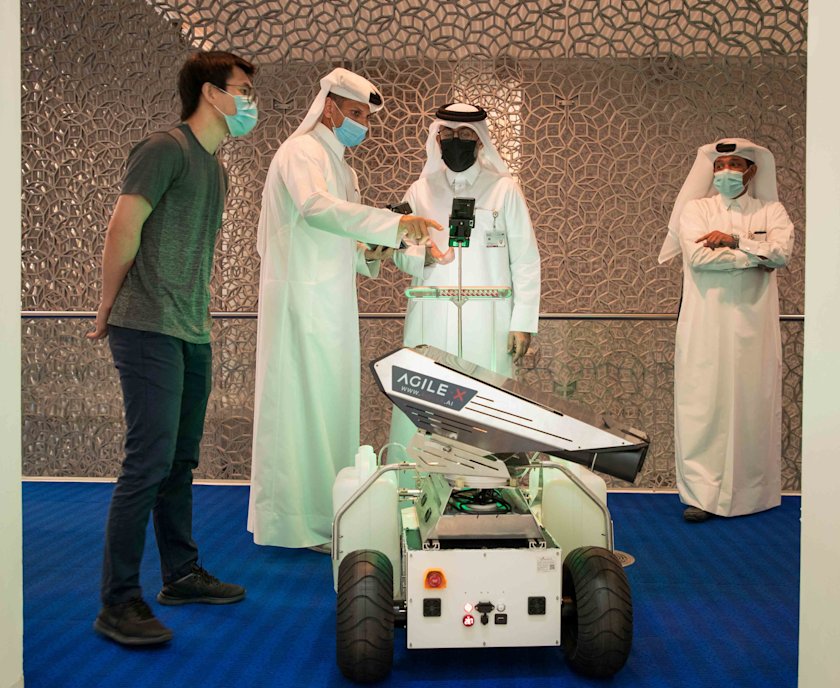
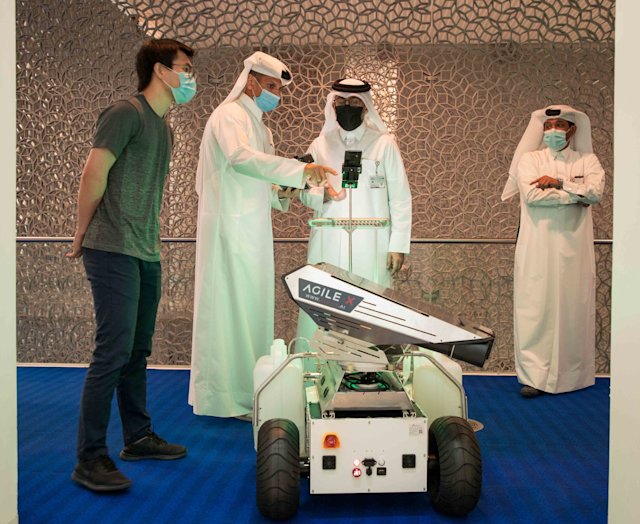
Translated into success
More than a decade after it was developed, a research paper co-authored by a QF academic that provides a solution for data encryption and cybersecurity remains unmatched.
And in August, it led to Dr. Roberto Di Pietro, a professor of cybersecurity at HBKU, and his fellow authors winning the 2020 Jean-Claude Laprie award, which recognizes outstanding advances in the field of dependable computing.
Also in the realm of computing, HBKU’s Qatar Computing Research Institute celebrated a milestone when its machine learning system, Shaheen, passed the one-billion mark in words translated. It develops accurate Arabic versions of English content and vice versa, and, since being launched in 2018, has been used in 46 countries across five continents, including by organizations such as Al Jazeera and the BBC.
“One of the priority areas of QCRI is Arabic language technologies, with the intention of promoting the language in the information age,” said QCRI scientist Dr. Hassan Sajjad. “Shaheen is one of QCRI’s successes in line with this objective.”
More than a decade after it was developed, a research paper co-authored by a QF academic that provides a solution for data encryption and cybersecurity remains unmatched.
And in August, it led to Dr. Roberto Di Pietro, a professor of cybersecurity at HBKU, and his fellow authors winning the 2020 Jean-Claude Laprie award, which recognizes outstanding advances in the field of dependable computing.
Also in the realm of computing, HBKU’s Qatar Computing Research Institute celebrated a milestone when its machine learning system, Shaheen, passed the one-billion mark in words translated. It develops accurate Arabic versions of English content and vice versa, and, since being launched in 2018, has been used in 46 countries across five continents, including by organizations such as Al Jazeera and the BBC.
“One of the priority areas of QCRI is Arabic language technologies, with the intention of promoting the language in the information age,” said QCRI scientist Dr. Hassan Sajjad. “Shaheen is one of QCRI’s successes in line with this objective.”
One of the priority areas of QCRI is Arabic language technologies, with the intention of promoting the language in the information age
QCRI’s Shaheen system has been used in 46 countries
Nimble and open
In August, QF partner university Northwestern University in Qatar welcomed its new dean and CEO, Marwan M. Kraidy – who spoke of how media and journalism is a public good that needs to be supported, rather than being seen solely as a business or commodity, and how students need to hone the skills necessary to succeed in the digital world.
“You cannot be overspecialized,” he said. “You need to learn to be nimble, and you need to be open to learning new things, which we did not think about as much before.”
Kraidy also explained that, during his tenure as Northwestern Qatar’s dean, he aims to harness “a place of immense potential, particularly in a country like Qatar where you have government commitment to education as a fundamental value for the nation”, and increase “the two-way traffic of ideas and constructive engagement” between Western nations and the Arab world.
In August, QF partner university Northwestern University in Qatar welcomed its new dean and CEO, Marwan M. Kraidy – who spoke of how media and journalism is a public good that needs to be supported, rather than being seen solely as a business or commodity, and how students need to hone the skills necessary to succeed in the digital world.
“You cannot be overspecialized,” he said. “You need to learn to be nimble, and you need to be open to learning new things, which we did not think about as much before.”
Kraidy also explained that, during his tenure as Northwestern Qatar’s dean, he aims to harness “a place of immense potential, particularly in a country like Qatar where you have government commitment to education as a fundamental value for the nation”, and increase “the two-way traffic of ideas and constructive engagement” between Western nations and the Arab world.
You need to learn to be nimble, and you need to be open to learning new things, which we did not think about as much before
Northwestern University in Qatar has 423 alumni
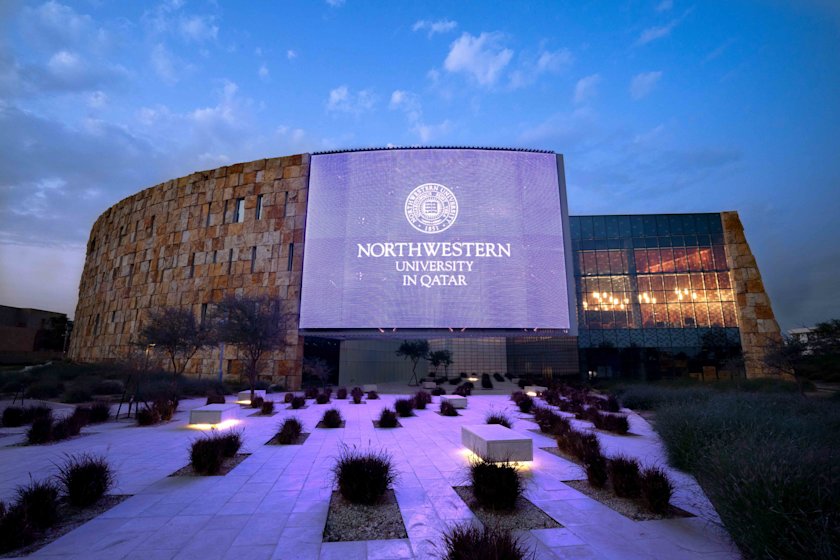
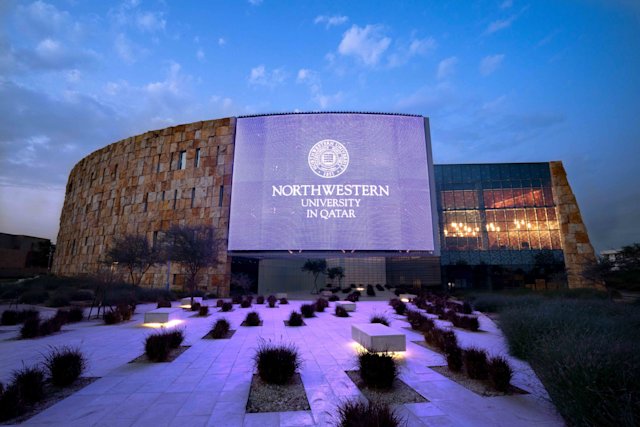
Dedication to diversity
And the month also saw another QF partner university – Carnegie Mellon University in Qatar (CMU-Q) – make a groundbreaking addition to its leadership ranks by appointing its first associate dean of diversity and climate.
Annette Vincent’s role will be to guide the university’s efforts to create a more diverse, inclusive, and equitable environment to study and work, with the outcomes of her work spreading beyond CMU-Q. One of her goals will be to form a student organization called Diversity and Climate Advocates, where, she says, “the students will be our voice within the student population”.
“We aspire to create a supportive climate, not only at CMU-Q, but also across Education City,” Vincent explained, “by collaborating with other universities and departments, to promote mutual respect and equal treatment among members of our community, and to make everyone feel a valued member.”
And the month also saw another QF partner university – Carnegie Mellon University in Qatar (CMU-Q) – make a groundbreaking addition to its leadership ranks by appointing its first associate dean of diversity and climate.
Annette Vincent’s role will be to guide the university’s efforts to create a more diverse, inclusive, and equitable environment to study and work, with the outcomes of her work spreading beyond CMU-Q. One of her goals will be to form a student organization called Diversity and Climate Advocates, where, she says, “the students will be our voice within the student population”.
“We aspire to create a supportive climate, not only at CMU-Q, but also across Education City,” Vincent explained, “by collaborating with other universities and departments, to promote mutual respect and equal treatment among members of our community, and to make everyone feel a valued member.”
We aspire to create a supportive climate, not only at CMU-Q, but also across Education City
CMU-Q’s academic programs focus on:
- Biological Sciences
- Business Administration
- Computer Science
- Information Systems
